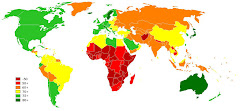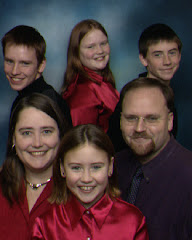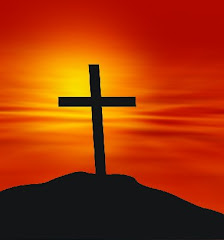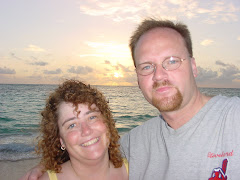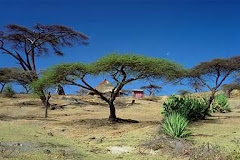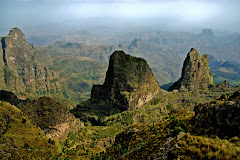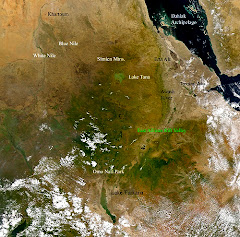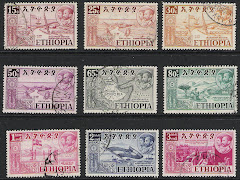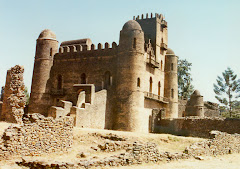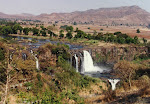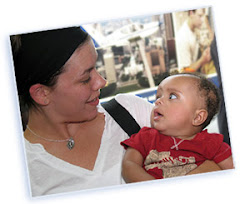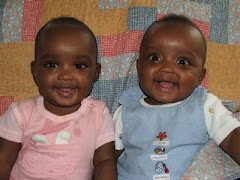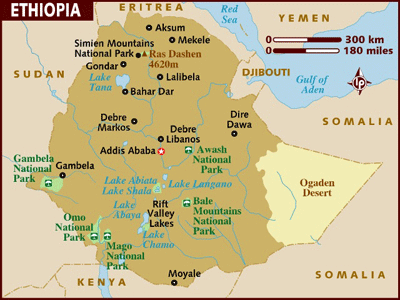Tuesday, May 12, 2009
A child shall lead them
We have a dear friend who is a wonderful mother. She recently shared a story with me about her daughters. They were all playing house the other day and they were going to an orphanage to adopt children. She said if I could have only seen the tenderness in her girls as they chose their babies at the orphanage and how they were struggling with the thought of leaving any of the children behind. Then she shared with me how one of her girls she found one day praying for our adoption the other day. It really touched me to hear this and I hope it does you all as well.
Wednesday, May 6, 2009
The hole in our gospel
We subscribe to emails from World Vision, their leader recently wrote a book titled "The hole in our gospel". Their recent email had a link to a website that highlighted the book. If you dont know World Vision is a Christian relief organization that works throughout the world to help the poor, the orphans, those in need. The prologue to the book is 5 pages in length, you can download it for free which I have done. I thought I would share it with you here. I would like to challenge anyone who is reading this to get this book and read it.
Prologue
But the angel said to them, “Do not be afraid. I bring you good news of great joy that will be for all the people.” —L U K E 2 : 1 0
Rakai, Uganda, August 1998
His name was Richard, the same as mine. I sat inside his meager thatch hut,
listening to his story, told through the tears of an orphan whose parents
had died of AIDS. At thirteen, Richard was trying to raise his two younger
brothers by himself in this small shack with no running water, electricity,
or even beds to sleep in. There were no adults in their lives—no one to care
for them, feed them, love them, or teach them how to become men. There
was no one to hug them either, or to tuck them in at night. Other than his
siblings, Richard was alone, as no child should be. I try to picture my own
children abandoned in this kind of deprivation, fending for themselves
without parents to protect them, and I cannot.
I didn’t want to be there. I wasn’t supposed to be there, so far out of my
comfort zone—not in that place where orphaned children live by themselves
in their agony. There, poverty, disease, and squalor had eyes and
faces that stared back, and I had to see and smell and touch the pain of the
poor. That particular district, Rakai, is believed to be ground zero for the
Ugandan AIDS pandemic. There, the deadly virus has stalked its victims
in the dark for decades. Sweat trickled down my face as I sat awkwardly
with Richard and his brothers while a film crew captured every tear—mine
and theirs.
I much preferred living in my bubble, the one that, until that moment,
had safely contained my life, family, and career. It kept difficult things like this
out, insulating me from anything too raw or upsetting. When such things
intruded, as they rarely did, a channel could be changed, a newspaper page
turned, or a check written to keep the poor at a safe distance. But not in
Rakai. There, “such things” had faces and names—even my name, Richard.
Not sixty days earlier I had been CEO of Lenox, America’s finest tableware
company, producing and selling luxury goods to those who could
afford them. I lived with my wife and five children in a ten-bedroom house
on five acres just outside of Philadelphia. I drove a Jaguar to work every
day, and my business travel took me to places such as Paris, Tokyo, London,
and Florence. I flew first-class and stayed in the best hotels. I was respected
in my community, attended a venerable suburban church, and sat on the
board of my kids’ Christian school. I was one of the good guys—you might
say a “poster child” for the successful Christian life. I had never heard of
Rakai, the place where my bubble would burst. But in just sixty days, God
turned my life inside out, and it would never be the same.
Quite unexpectedly, eight months earlier, I had been contacted by World Vision, the Christian relief and development organization, during their search for a new president. Why me? It wasn’t something I had sought after. In fact,you might say I had been minding my own business when the phone rang that day. But it was a phone call that had been twenty-four years in the planning.You see, in 1974, at the age of twenty-three, in my graduate school dormitory,I knelt down beside my bed and dedicated my life to Christ. This was no small decision for me, and it came only after months of reading, studying, conversations with friends, and the important witness of Reneé, the woman who would later become my wife. While at the time I knew very little about the implications of that decision, I knew this: nothing would ever be quite the same again, because I had made a promise to follow Christ—no matter what.
The Man Who Wouldn’t Buy China . . .
Several months after becoming a Christian, I was newly engaged to Reneé.
As we were planning our wedding and our life together, she suggested that
we go to a department store to register for our china, crystal, and silver. My
self-righteous response was an indication of just how my newfound faith
was integrating into my life: “As long as there are children starving in the
world, we’re not going to own fine china, crystal, and silver.” Perhaps you
can see God’s sense of irony in my becoming president of America’s premier
fine tableware company a couple of decades later. So when I answered
that phone call from World Vision in January 1998, I knew that God was
on the other end of the line. It was His voice I heard, not the recruiter’s:
Rich, do you remember that idealistic young man in 1974 who was so passionate
about starving children that he would not even fill out a wedding registry? Take
a good look at yourself now. Do you see what you’ve become? But, Rich, if you
still care about those children, I have a job I want you to do
.In my prayers over the weeks leading up to my appointment as World Vision’s president, I begged God to send someone else to do it, much as Moses had done.Surely this was a mistake. I was no MotherTeresa. I remember praying that God would send me anywhere else, “but, please, God, not to the poor—not into the pain and alienation of poverty and disease, not there.” I didn’twant to go there.
Yet here I was, the new president of WorldVision, sent by knowing staff to get a “baptism by fire” for my new calling, with a film crew to document every moment.
Bob Pierce, the founder of World Vision, once prayed, “Let my heart
be broken by the things that break the heart of God.” But who really wants
his heart broken? Is this something to ask of God? Don’t we pray that God
will not break our hearts? But as I look at the life of Jesus, I see that He was,
as Isaiah described him, “a Man of sorrows . . . acquainted with grief ”
(53:3 NKJV). Jesus’ heart was continually moved to compassion as He
encountered the lame, the sick, the widow, and the orphan. I try to picture
God’s broken heart as He looks today upon the broken world for which He
died. Surely Richard’s story breaks His heart.
Two crude piles of stones just outside the door mark the graves of
Richard’s parents. It disturbs me that he must walk past them every day. He
and his brothers must have watched first their father and then their mother
die slow and horrible deaths. I wondered if the boys were the ones who fed
them and bathed them in their last days. Whatever the case, Richard, a
child himself, is now the head of household.
Child-headed household, words never meant to be strung together. I tried to wrap my mind around this new phrase, one that describes not only Richard’s plight but that of tens of thousands, even millions more. I’m told that there are sixty thousand orphans just in Rakai, twelve million orphans due to AIDS in sub-Saharan Africa.2 How can this be true? Awkwardly I asked Richard what he hopes to be when he grows up, a ridiculous question to ask a child who has lost his childhood. “A doctor,” he said, “so I can help people who have the disease.”
“Do you have a Bible?” I asked. He ran to the other room and returned with his treasured book with gold-gilt pages. “Can you read it?” “I love to read the book of John, because it says that Jesus loves the children.”
This overwhelmed me, and my tears started to flow. Forgive me, Lord, forgive me. I didn’t know. But I did know. I knew about poverty and suffering in the world. I was aware that children die daily from starvation and
lack of clean water. I also knew about AIDS and the orphans it leaves
behind, but I kept these things outside of my insulating bubble and looked
the other way.
Yet this was to be the moment that would ever after define me. Rakai was what God wanted me to see. My sadness that day was replaced by
repentance. Despite what the Bible had told me so clearly, I had turned a
blind eye to the poor. Now my heart was filled with anger, first at myself,
and then toward the world. Why wasn’t Richard’s story being told? The
media overflowed with celebrity dramas, stock market updates, and Bill
Clinton’s impending impeachment hearings. But where were the headlines
and magazine covers about Africa? Twelve million orphans, and no one
noticed? But what sickened me most was this question: where was the
Church? Indeed, where were the followers of Jesus Christ in the midst of
perhaps the greatest humanitarian crisis of our time? Surely the Church
should have been caring for these “orphans and widows in their distress”
(James 1:27). Shouldn’t the pulpits across America have flamed with
exhortations to rush to the front lines of compassion? Shouldn’t they be
flaming today? Shouldn’t churches be reaching out to care for children in
such desperate need? How could the great tragedy of these orphans get
drowned out by choruses of praise music in hundreds of thousands of
churches across our country? Sitting in a hut in Rakai, I remember thinking,
How have we missed it so tragically, when even rock stars and Hollywood
actors seem to understand?
Ten years later I know. Something fundamental has been missing in our understanding of the gospel.
The word gospel literally means “good news.” Jesus declared that He had come to “preach good news to the poor” (Luke 4:18). But what good news, what gospel, did the Church have for Richard and his brothers in Rakai? What “good news” have God’s people brought to the world’s three billion poor?3 What “gospel” have millions of Africa’s AIDS orphans seen?4 What gospel have most of us embraced in the twenty-first century?
The answer is found in the title of this book: a gospel with a hole in it.
Prologue
But the angel said to them, “Do not be afraid. I bring you good news of great joy that will be for all the people.” —L U K E 2 : 1 0
Rakai, Uganda, August 1998
His name was Richard, the same as mine. I sat inside his meager thatch hut,
listening to his story, told through the tears of an orphan whose parents
had died of AIDS. At thirteen, Richard was trying to raise his two younger
brothers by himself in this small shack with no running water, electricity,
or even beds to sleep in. There were no adults in their lives—no one to care
for them, feed them, love them, or teach them how to become men. There
was no one to hug them either, or to tuck them in at night. Other than his
siblings, Richard was alone, as no child should be. I try to picture my own
children abandoned in this kind of deprivation, fending for themselves
without parents to protect them, and I cannot.
I didn’t want to be there. I wasn’t supposed to be there, so far out of my
comfort zone—not in that place where orphaned children live by themselves
in their agony. There, poverty, disease, and squalor had eyes and
faces that stared back, and I had to see and smell and touch the pain of the
poor. That particular district, Rakai, is believed to be ground zero for the
Ugandan AIDS pandemic. There, the deadly virus has stalked its victims
in the dark for decades. Sweat trickled down my face as I sat awkwardly
with Richard and his brothers while a film crew captured every tear—mine
and theirs.
I much preferred living in my bubble, the one that, until that moment,
had safely contained my life, family, and career. It kept difficult things like this
out, insulating me from anything too raw or upsetting. When such things
intruded, as they rarely did, a channel could be changed, a newspaper page
turned, or a check written to keep the poor at a safe distance. But not in
Rakai. There, “such things” had faces and names—even my name, Richard.
Not sixty days earlier I had been CEO of Lenox, America’s finest tableware
company, producing and selling luxury goods to those who could
afford them. I lived with my wife and five children in a ten-bedroom house
on five acres just outside of Philadelphia. I drove a Jaguar to work every
day, and my business travel took me to places such as Paris, Tokyo, London,
and Florence. I flew first-class and stayed in the best hotels. I was respected
in my community, attended a venerable suburban church, and sat on the
board of my kids’ Christian school. I was one of the good guys—you might
say a “poster child” for the successful Christian life. I had never heard of
Rakai, the place where my bubble would burst. But in just sixty days, God
turned my life inside out, and it would never be the same.
Quite unexpectedly, eight months earlier, I had been contacted by World Vision, the Christian relief and development organization, during their search for a new president. Why me? It wasn’t something I had sought after. In fact,you might say I had been minding my own business when the phone rang that day. But it was a phone call that had been twenty-four years in the planning.You see, in 1974, at the age of twenty-three, in my graduate school dormitory,I knelt down beside my bed and dedicated my life to Christ. This was no small decision for me, and it came only after months of reading, studying, conversations with friends, and the important witness of Reneé, the woman who would later become my wife. While at the time I knew very little about the implications of that decision, I knew this: nothing would ever be quite the same again, because I had made a promise to follow Christ—no matter what.
The Man Who Wouldn’t Buy China . . .
Several months after becoming a Christian, I was newly engaged to Reneé.
As we were planning our wedding and our life together, she suggested that
we go to a department store to register for our china, crystal, and silver. My
self-righteous response was an indication of just how my newfound faith
was integrating into my life: “As long as there are children starving in the
world, we’re not going to own fine china, crystal, and silver.” Perhaps you
can see God’s sense of irony in my becoming president of America’s premier
fine tableware company a couple of decades later. So when I answered
that phone call from World Vision in January 1998, I knew that God was
on the other end of the line. It was His voice I heard, not the recruiter’s:
Rich, do you remember that idealistic young man in 1974 who was so passionate
about starving children that he would not even fill out a wedding registry? Take
a good look at yourself now. Do you see what you’ve become? But, Rich, if you
still care about those children, I have a job I want you to do
.In my prayers over the weeks leading up to my appointment as World Vision’s president, I begged God to send someone else to do it, much as Moses had done.Surely this was a mistake. I was no MotherTeresa. I remember praying that God would send me anywhere else, “but, please, God, not to the poor—not into the pain and alienation of poverty and disease, not there.” I didn’twant to go there.
Yet here I was, the new president of WorldVision, sent by knowing staff to get a “baptism by fire” for my new calling, with a film crew to document every moment.
Bob Pierce, the founder of World Vision, once prayed, “Let my heart
be broken by the things that break the heart of God.” But who really wants
his heart broken? Is this something to ask of God? Don’t we pray that God
will not break our hearts? But as I look at the life of Jesus, I see that He was,
as Isaiah described him, “a Man of sorrows . . . acquainted with grief ”
(53:3 NKJV). Jesus’ heart was continually moved to compassion as He
encountered the lame, the sick, the widow, and the orphan. I try to picture
God’s broken heart as He looks today upon the broken world for which He
died. Surely Richard’s story breaks His heart.
Two crude piles of stones just outside the door mark the graves of
Richard’s parents. It disturbs me that he must walk past them every day. He
and his brothers must have watched first their father and then their mother
die slow and horrible deaths. I wondered if the boys were the ones who fed
them and bathed them in their last days. Whatever the case, Richard, a
child himself, is now the head of household.
Child-headed household, words never meant to be strung together. I tried to wrap my mind around this new phrase, one that describes not only Richard’s plight but that of tens of thousands, even millions more. I’m told that there are sixty thousand orphans just in Rakai, twelve million orphans due to AIDS in sub-Saharan Africa.2 How can this be true? Awkwardly I asked Richard what he hopes to be when he grows up, a ridiculous question to ask a child who has lost his childhood. “A doctor,” he said, “so I can help people who have the disease.”
“Do you have a Bible?” I asked. He ran to the other room and returned with his treasured book with gold-gilt pages. “Can you read it?” “I love to read the book of John, because it says that Jesus loves the children.”
This overwhelmed me, and my tears started to flow. Forgive me, Lord, forgive me. I didn’t know. But I did know. I knew about poverty and suffering in the world. I was aware that children die daily from starvation and
lack of clean water. I also knew about AIDS and the orphans it leaves
behind, but I kept these things outside of my insulating bubble and looked
the other way.
Yet this was to be the moment that would ever after define me. Rakai was what God wanted me to see. My sadness that day was replaced by
repentance. Despite what the Bible had told me so clearly, I had turned a
blind eye to the poor. Now my heart was filled with anger, first at myself,
and then toward the world. Why wasn’t Richard’s story being told? The
media overflowed with celebrity dramas, stock market updates, and Bill
Clinton’s impending impeachment hearings. But where were the headlines
and magazine covers about Africa? Twelve million orphans, and no one
noticed? But what sickened me most was this question: where was the
Church? Indeed, where were the followers of Jesus Christ in the midst of
perhaps the greatest humanitarian crisis of our time? Surely the Church
should have been caring for these “orphans and widows in their distress”
(James 1:27). Shouldn’t the pulpits across America have flamed with
exhortations to rush to the front lines of compassion? Shouldn’t they be
flaming today? Shouldn’t churches be reaching out to care for children in
such desperate need? How could the great tragedy of these orphans get
drowned out by choruses of praise music in hundreds of thousands of
churches across our country? Sitting in a hut in Rakai, I remember thinking,
How have we missed it so tragically, when even rock stars and Hollywood
actors seem to understand?
Ten years later I know. Something fundamental has been missing in our understanding of the gospel.
The word gospel literally means “good news.” Jesus declared that He had come to “preach good news to the poor” (Luke 4:18). But what good news, what gospel, did the Church have for Richard and his brothers in Rakai? What “good news” have God’s people brought to the world’s three billion poor?3 What “gospel” have millions of Africa’s AIDS orphans seen?4 What gospel have most of us embraced in the twenty-first century?
The answer is found in the title of this book: a gospel with a hole in it.
Subscribe to:
Posts (Atom)
